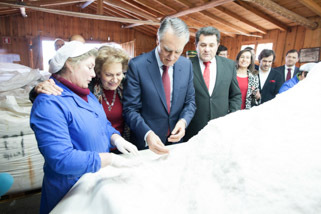Speech by the Presidente of the Republic at the dinner at Queluz Palace on the occasion of the First Meeting of the Globalization Council
Queluz Palace, 10 November 2006
Minister for the Economy and Innovation
Mayor of Sintra
President of COTEC - Portugal
Ladies and Gentlemen
We have with us today an important group of leaders of global enterprises who participated in the first meeting of the Globalization Council.
They have come from various corners of the earth: from Europe, Africa, the United States, Brazil, the Middle East and Asia.
This is an unique group of people, responsible for the management of global organisations with activities all over the world, all strongly committed to I&D and used to taking decisions on substantial investments. Their visit to Portugal provides an excellent opportunity for a deeper understanding of the current stage of globalization.
Tonight, this group is joined by the 100 largest Portuguese companies to whom I extend a warm welcome. All members of COTEC, they have demonstrated their capacity to face up to the challenges of globalization and take advantage of its opportunities.
The aim of the first meeting of the Globalization Council was to allow for the reflection and shared understanding, by influential corporate leaders with global experience, on the ways of promoting a pluralistic globalization. As this is a Portuguese initiative, held in Portugal, the subject also touches on the challenges and opportunities provided by globalization for a country such as Portugal.
The term “globalization” means the increasing mobility of goods, services, jobs, ideas, technology and capital at a planetary scale. Although it is not a new phenomenon, globalization has intensified, first by the conjunction of a number of political and economic factors: post-war stability, the creation and consolidation of the United Nations, the creation of institutions to manage the rules of international trade, the end of colonialism, the progressive reduction of barriers to international trade and investment, the economic transformation begun by China at the end of the 70s, the break up of the eastern bloc in the late 80s and the economic reforms undertaken in democratic India in the 90s.
To these factors a powerful catalyst was added: a technological revolution that not only exponentially increased the quality and speed of communications but has also dramatically reduced the cost of producing, processing, storing and transmitting information. The world now has planetary communication infrastructures which are accessible from any equipment, at any time and in any place.
In the so-called emerging countries the opening of the markets has dragged millions of people out of poverty, raised hope and created new horizons of well-being. The great risk for any country, including the poorest, is to become isolated from globalization.
The challenge is no longer “Think Global and Act Local”, it is: “Think Global, Act Global”. In other words, supply global products and services designed by global talents, based on global knowledge for global markets.
The first meeting of the Globalization Council has shown that global competition is itself changing. An increasingly knowledge-based economy is emerging. And the knowledge a company needs to compete on a global scale is not found in one place or country but all over the world.
The current challenge lies in being able to innovate and to learn from the world. It consists in being able to identify knowledge dispersed around the many parts of the world, combine it and leverage it at global scale. In a knowledge-based economy there are no peripheral countries. There are business leaders capable of building their competitive advantage by integrating knowledge dispersed around the world, able to mobilize this knowledge and combine it in a globally innovative and efficient way.
A company does not necessarily have to belong to a rich economy to compete in the global market. Portuguese entrepreneurs and businessmen do not have to be limited to their national context or circumstances. I am firmly convinced that, like others, they will know how to use the world as a source of knowledge, innovation and competitiveness.
